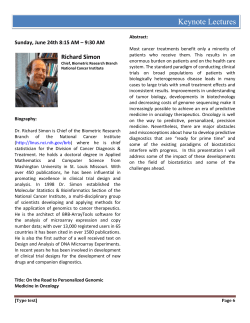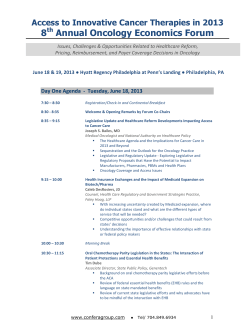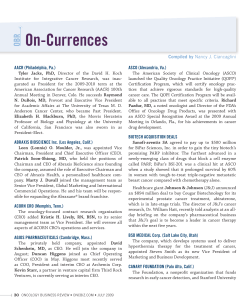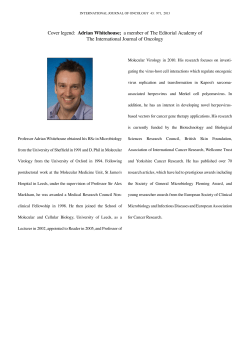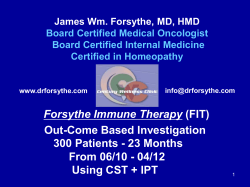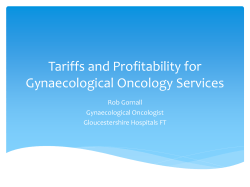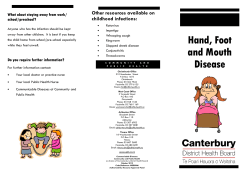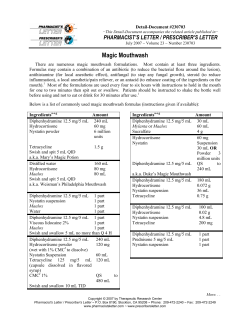
Royal United Hospital Bath NHS Trust
Royal United Hospital Bath NHS Trust Prevention and Treatment of Stomatitis & Mucositis in patient receiving chemotherapy Prevention and Treatment of Stomatitis & Mucositis in patient receiving chemotherapy Reference Number: 406 2006 Author / Manager Responsible: Karen Skelley First Reviewed: November 2005 Next Review Date: December 2008 Ratified by: Oncology / Haematology Drugs and Therapeutic Committee Date Ratified: December 2005 Related Policies Version 2 Local Policy Oncology/ Haematology Department Page 1 of 12 Royal United Hospital Bath NHS Trust Prevention and Treatment of Stomatitis & Mucositis in patient receiving chemotherapy INDEX Section Policy - Page - - - - - - - - 4 Introduction - - - - - - - - 4 Definition - - - - - - 4 Standard Mouth care Protocol - - - - - 4 Health Promotion - - - - - 5 - - - Increased Risk Factors for Mucositis/Stomatitis 5 List of Stomatotoxic drugs - - - - - - 7 Specific Interventions - - - - - - 8 Individual Interventions - - - - - - 9 Lips / Corners of mouth - - - - - - 9 Candida / Infection - - - - - - - 9 Tongue - - - - - - - - 9 Dry mouth - - - - - - - - 9 - - - - - - - 10 Swallowing or chewing - - - - - - 10 Comfort Teeth/dentures - - - - - - - - 10 References - - - - - - - - 11 Version 2 Local Policy Oncology/ Haematology Department Page 2 of 12 Royal United Hospital Bath NHS Trust Prevention and Treatment of Stomatitis & Mucositis in patient receiving chemotherapy CONSULTATION AND RATIFICATION SCHEDULE Name and Title of Individual Date Consulted Rosie Simpson Oncology Pharmacist Maggie Crowe Nurse consultant Caroline Gilleece Matron Oncology/ Haematology Dept Dr Gliby Oncologist November 2005 November 2005 November 2005 Name of Committee Drug and Therapeutic Meeting Date of Committee 24/11/05 October 2005 Version 2 Local Policy Oncology/ Haematology Department Page 3 of 12 Royal United Hospital Bath NHS Trust Prevention and Treatment of Stomatitis & Mucositis in patient receiving chemotherapy POLICY INTRODUCTION The evidence suggests that stomatitis and mucositis is not preventable in patients receiving chemotherapy, but its severity can be minimized through the implementation of effective oral health practices (Kennedy and Diamond 1997). A realistic objective is to reduce the severity and duration of stomatitis / mucositis and to minimize the complications of pain, oral and systemic infection, bleeding and malnutrition. To achieve this, it is important to: Identify those patients at risk of developing oral complications as soon as possible. Have a knowledge and understanding of chemotherapy agents used and their effects. The most important factor in oral care is the frequency rather than product used. It is also important the mouth is kept moist and free from debris (Campbell at al, 1995). DEFINITION: Mucositis: Oral mucositis is soreness, inflammation or ulceration of the mouth lining, which can cause pain and discomfort. These ulcers can become infected and bleed. The pain can be severe enough to make eating or drinking very difficult. Stomatitis: Stomatitis is a general term applied to diffuse inflammatory, erosive and ulcerative condition affecting the mucous membranes lining the mouth. Which may involve the cheeks, gums, tongue, lips, and roof or floor of the mouth? STANDARD MOUTHCARE PROTOCOL All patients will have an oral assessment undertaken with each cycle or daily for inpatients: a) To identify usual oral care routine b) To identify the advice/care required to maintain or promote individual oral hygiene. The Oral Assessment Guide using Modified Jenkins Mouth care Assessment Tool should be implemented for all patients identified with problems or at high risk, and assessment undertaken daily Teeth and tongue should be cleaned twice daily with a medium small head toothbrush and fluoride toothpaste. The mouth should be rinsed thoroughly with water after cleaning Version 2 Local Policy Oncology/ Haematology Department Page 4 of 12 Royal United Hospital Bath NHS Trust Prevention and Treatment of Stomatitis & Mucositis in patient receiving chemotherapy Dentures should be a) Removed a minimum of twice a day, cleaned with a brush and rinsed with water b) Soaked overnight in water or the patient’s usual solution, cleaned with a brush and rinsed prior to putting back into patient’s mouth Adequate oral fluid intake and self care measures should be encouraged and the necessary Equipment/Information/Education provided to meet individual needs Care should be negotiated with the patient and the level of assistance required identified HEALTH PROMOTION Prior to commencement of treatment (where possible) a) Ensure all head and neck patients (excluding Larynx) have been referred to Head and Neck Clinical Nurse Specialist. b) Ensure all head and neck patients are referred to Dietician c) Ensure appropriate chemotherapy patients identified at increased risk of mucositis are referred Dietician Encourage, six monthly visits to the dentist. Advise patients to seek advice prior to undergoing any ongoing treatment Encourage patient to stop smoking and drinking alcohol General advice with regards to sugary snacks INCREASED RISK FACTORS FOR MUCOSITIS/ STOMATISIS Cancer of the head and neck Intensive chemotherapy regimes/Bone marrow transplantation /Leukaemia Elderly and children Deficits in self care ability Altered fluid or nutritional status (dehydration, malnutrition) Receiving certain medications, particularly steroids Exposed to additional stressors (alcohol, tobacco, drugs, oxygen therapy) Version 2 Local Policy Oncology/ Haematology Department Page 5 of 12 Royal United Hospital Bath NHS Trust Prevention and Treatment of Stomatitis & Mucositis in patient receiving chemotherapy Liver/renal impairment Previous experience of mucositis Receiving Stomatotoxic drugs Version 2 Local Policy Oncology/ Haematology Department Page 6 of 12 Royal United Hospital Bath NHS Trust Prevention and Treatment of Stomatitis & Mucositis in patient receiving chemotherapy LIST OF STOMATOTOXIC DRUGS Moderate risk Bleomycin Cytarabine Dactinomycin Mitomycin-C Paclitaxel Ralititrexed Thioguanine Vinblastine High risk Capecitabine Docetaxel Doxorubicin Epirubicin Fluorouracil Liposomal Doxorubicin High dose Melphalan Methotrexate 6 Mercaptopurine Idarubicin Version 2 Local Policy Oncology/ Haematology Department Page 7 of 12 Royal United Hospital Bath NHS Trust Prevention and Treatment of Stomatitis & Mucositis in patient receiving chemotherapy SPECIFIC INTERVENTIONS Specific Interventions Mucous Membranes Assessment Chemotherapy; : Score 1-7 Follow standard mouth care protocol. Use soft toothbrush whilst Healthy Mouth Neutropenic Score 7-14 Mild – Moderate Mucositis Continue Standard mouth care protocol, increasing tooth brushing to follow meals and at bed time. Use soft toothbrush Painless ulcers with erythema or mild soreness in the absence of lesions or Painful erythema, oedema or ulcers but can eat or swallow Score 14-21 + Introduce chlorhexidine mouthwash twice daily for all patients if able to tolerate + Refer to Consultant / Registrar for appropriate antifungal / antibacterial /antiviral agents Continue standard mouth care protocol as long as possible. Severe Mucositis Severe ulceration or requires parenteral or enteral nutritional support + Continue chlorhexidine mouthwash twice or QDS if patient is neutropenic daily if able to tolerate. + Refer to Consultant / Registrar for appropriate antifungal / antibacterial /antiviral agents + Intravenous fluids / parenteral support may be required Version 2 Local Policy Oncology/ Haematology Department Page 8 of 12 Royal United Hospital Bath NHS Trust Prevention and Treatment of Stomatitis & Mucositis in patient receiving chemotherapy INDIVIDUAL INTERVENTIONS Lips / corners of mouth: Use yellow soft paraffin as a moisturizer for lips. Use sparingly – Do not apply directly before radiotherapy treatment as it will act as another layer of skin, resulting in potentially affecting the depth of treatment. Observe for herpes simplex and refer to Consultant / Registrar for appropriate antiviral agent. Candida / Infection: Observe for white patches or creamy white areas. These could be an indication of infection, thrush or radiation plaque (fibrin) Monitor for any signs of halitosis – Oraldene mouthwash may be effective Refer to Consultant / Registrar for appropriate antifungal / antibacterial /antiviral agents. Tongue: Blistered / Cracked Increase fluid intake, particularly water Ensure adequate analgesia Encourage the use of mouthwashes Dry Mouth (xerostomia) Increase fluid intake Increase use of sauces, gravies etc Consider use of crushed ice, artificial saliva and sugar free chewing gum. Note, if ice pops are used, use sugar free juice. Patients often find sucking boiled sweets helpful. Encourage low sugar variety in dentulous patients. Avoid citrus drinks if this causes further pain or discomfort. Version 2 Local Policy Oncology/ Haematology Department Page 9 of 12 Royal United Hospital Bath NHS Trust Prevention and Treatment of Stomatitis & Mucositis in patient receiving chemotherapy Teeth / Dentures: Ensure any patients with loose teeth, ill fitting dentures or caries are encouraged to see their dentists. Encourage patient to remove dentures overnight and soak in water or patients usual solution. Swallowing or chewing: Consider nutritional impact. Commence nutritional care plan. Ensure referral to dietician. Comfort: There are a range of interventions which help to reduce discomfort/pain, depending on severity. Information is given on some of the most common preparation, when and how they should be given comments Give ½ an hour before meals and Paracetamol mixture Dispersible before. Do not exceed maximum 4grams daily dose and do not take with other medicines containing paracetamol 10mls as required 4 x daily. ½hour Benzydamine (Difflam) before meals. Can cause stinging. May be diluted 50/50 with water. Use for 7 consecutive days only. Tolerance may develop Use before meals. May have some Sucralfate Suspension 1g in 5mls prophylactic value and promote healing / reduce severity of mucositis. Use as a mouthwash (swish and spit out) or swallow to relieve oral discomfort. If pain still not under adequate control, consider adding: Dispersible co-codamol 30/500 Monitor bowel function as aperients may need to be titrated accordingly. Can be given 4-6 hourly but do not exceed maximum daily dose. 8tablets/daily If pain control still ineffective move onto opioids either orally or by subcutaneous injection Controlled systemic analgesia Oramorph Zormorph Monitor bowel function as aperients may need to be titrated accordingly. Diamorphine subcutaneous pump or equivalent Version 2 Local Policy Oncology/ Haematology Department Page 10 of 12 Royal United Hospital Bath NHS Trust Prevention and Treatment of Stomatitis & Mucositis in patient receiving chemotherapy REFERENCES Clarkson J E, Worthington H V, Eden OB, (2003) Interventions for preventing oral mucositis for patients with cancer receiving treatment (Cochrane Review). The Cochrane Library, Issue 4, Chichester, UK: John Wiley & Sons Campbell S J, Evans M A and MacTavish F. (1995). Guidelines for mouth care. Second Edition. The Royal College of Nursing. Paediatric Oncology Nursing Forum. Dose A. M. (1995) the symptom experience of mucositis, stomatitis and xerostomi. Seminars in oncology nursing. Vol.11.no.4. pp248-255 Kennedy L and Diamond J. (1997) Assessment and management of chemotherapy induced mucositis in children. Journal of paediatric oncology nursing. Vol. 14 Version 2 Local Policy Oncology/ Haematology Department Page 11 of 12 Royal United Hospital Bath NHS Trust Prevention and Treatment of Stomatitis & Mucositis in patient receiving chemotherapy CONSULTATION CHECKLIST Author, please attach this to each copy of the policy being sent to a meeting for comments. Dear Chairman, please would you review this policy at your committee and return any amendments / comments to ____________________________ by _____ / _____ / _____ Title of meeting Oncology / Haematology _Drugs and therapeutic committee Date of meeting 24th November 2005 _____ The name of policy Prevention and Treatment of Stomatitis & Mucositis in patient receiving chemotherapy Name of author Karen Skelley Yes Are there any elements of this policy which present operational issues that require further discussion? If yes, please provide a contact name for the author. ___________________________________ Is the policy referenced? No N/A ✔ ✔ Does the policy include a training plan? ✔ If you are the appropriate forum, have the necessary resources been agreed to implement this policy? Is there a plan for policy implementation? Does your meeting recommend further consultation with groups or staff other than listed at the front of the policy? Other comments from meeting. Policy accepted without further comment. (Please circle) Policy needs further amendment. (Please circle) ✔ ✔ Yes / No Yes / No Name of Chris Knechtli Clinical Lead Oncology / Haematology Signature ______________________________ Date _____ / _____ / _____ Rosie Simpson Chair of Oncology / Haematology Drugs Therapeutic Committee Signature ______________________________ Date _____ / _____ / _____ Version 2 Local Policy Oncology/ Haematology Department Page 12 of 12
© Copyright 2025



